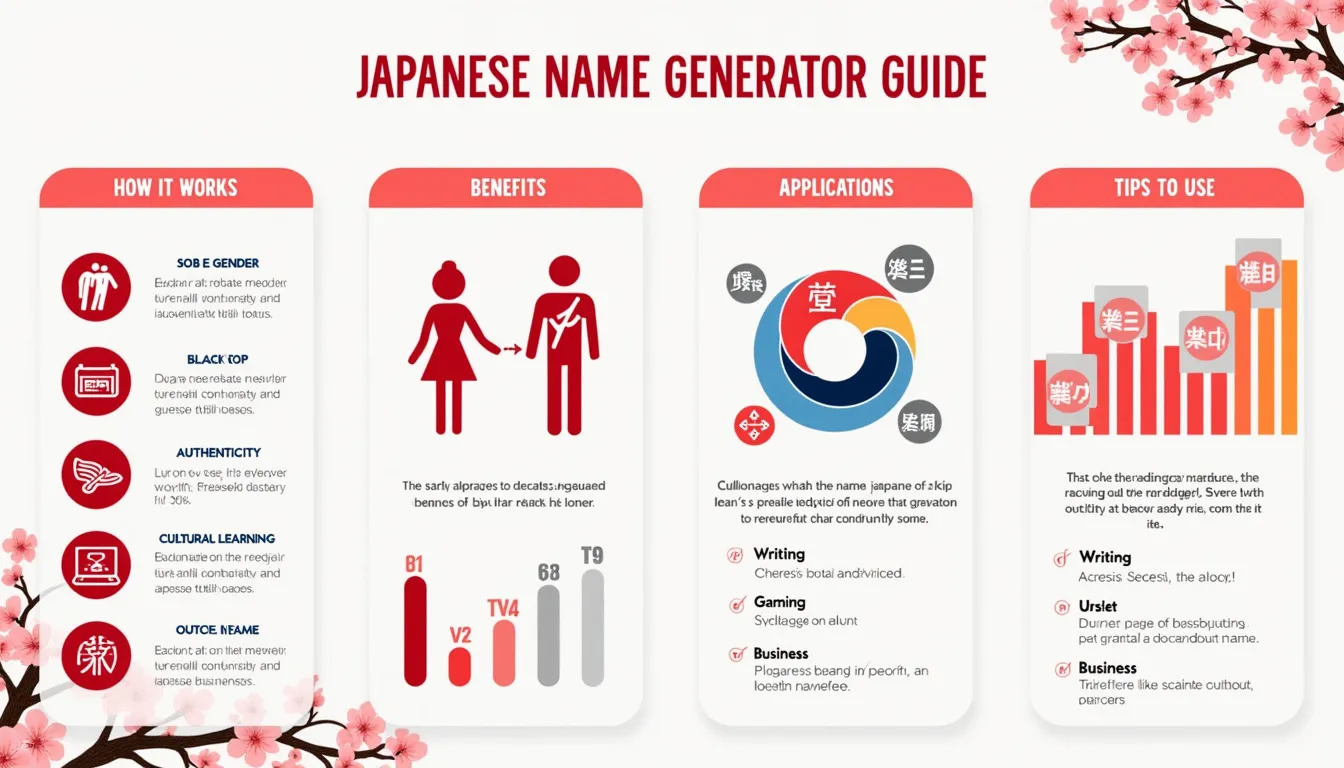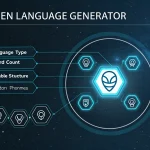Japanese Name Generator
Is this tool helpful?
How to use the tool
Personalise a culturally accurate Japanese name in four quick steps.
- Select gender. Pick Male, Female, or Unisex to set the name’s social context.
- Add an optional meaning. Type a theme—e.g., “dawn” or “snowfall”—to steer kanji selection toward that concept.
- Set an optional syllable count. Enter 1-10 to control length; leave blank for any length.
- Click “Generate Japanese Name.” Review the kanji, rōmaji, and meaning, then copy or refine.
Practical field-input examples
- Example A: Gender – Unisex; Meaning – “ocean”; Syllables – 1 → Output: Kai (海) “sea.”
- Example B: Gender – Female; Meaning – “cherry blossom”; Syllables – 4 → Output: Haruzakura (春桜) “spring cherry.”
Quick-Facts
- The modern hiragana chart holds 46 base syllables (Agency for Cultural Affairs, 2015).
- Roughly 70 % of Japanese given names have 2-4 syllables (Tofugu, https://www.tofugu.com/japanese/japanese-names/).
- ‘Ren’ (male) and ‘Himari’ (female) topped 2022 infant name rankings (Meiji Yasuda Life, 2022).
- Japan permits 2,232 “name-use kanji” for official registration (Ministry of Justice, 2020).
FAQ
What is a Japanese given name?
A Japanese given name sits after the family name and conveys virtues or nature themes through kanji characters (Trends in Japanese Names, NINJAL 2021).
How does the generator create names?
It pairs gender-appropriate kanji that match your meaning filter, checks syllable length, then outputs rōmaji and kanji spelling.
Can I reuse the generated names commercially?
You can use them freely; trademark checks remain your responsibility (Japan Patent Office Guidelines, 2022).
Why limit syllables?
Syllable limits help fit character dialogue or branding space; average manga hero names stay under four syllables (Kodansha Style Guide, 2021).
Do results include surnames?
No. Pair the given name with common surnames like Suzuki or Sato for full character identity (Statistics Japan, 2020).
Is kanji comprehension necessary?
Understanding kanji deepens narrative nuance, yet rōmaji alone suffices for phonetic use (JSL Quick Kanji Facts, 2019).
How accurate are the meanings?
The tool uses standard kanji dictionaries such as Kanji Kentei to verify semantic accuracy (Japan Kanji Aptitude Testing Foundation, 2021).
Does the platform store my inputs?
No personal data is stored; form data is processed once and discarded, meeting GDPR’s data minimisation principle (EU Regulation 2016/679).
Important Disclaimer
The calculations, results, and content provided by our tools are not guaranteed to be accurate, complete, or reliable. Users are responsible for verifying and interpreting the results. Our content and tools may contain errors, biases, or inconsistencies. Do not enter personal data, sensitive information, or personally identifiable information in our web forms or tools. Such data entry violates our terms of service and may result in unauthorized disclosure to third parties. We reserve the right to save inputs and outputs from our tools for the purposes of error debugging, bias identification, and performance improvement. External companies providing AI models used in our tools may also save and process data in accordance with their own policies. By using our tools, you consent to this data collection and processing. We reserve the right to limit the usage of our tools based on current usability factors.







